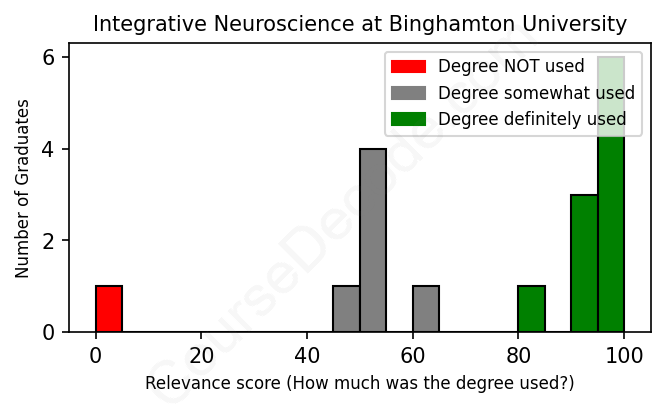
First, some facts. Of the Integrative Neuroscience graduates from Binghamton University we've analyzed , here's how many have used (or NOT used) their degree in their career:

These are estimates based on AI analysis of 17 LinkedIn profiles (see below).
The verdict? Above average. Overall, with an average relevance score of 74%, Integrative Neuroscience graduates from Binghamton University have a higher likelihood (+7%) of finding work in this field compared to the average graduate across all fields:
And for comparison, here's the chart for all profiles we've looked at across all degrees.
Also, after graduating, 70% of these graduates have pursued further education other than another Bachelor's degree (such as a Masters degree or other), compared to the average across all profiles of 35%. This suggests you may need more than just a Bachelors degree to be competitive as a Integrative Neuroscience graduate.
See the details:
|
Relevance score: 92% We think this person has gone into a career highly relevant to their degree. We think this person has gone into a career highly relevant to their degree.
DEGREE INFOGraduated in 2021 from Binghamton University with a Bachelor of Science - BS in Integrative Neuroscience. Also pursued further education since (see below). JOB HISTORY SINCE GRADUATIONStudent Researcher - Genetics Lab Binghamton University Jan 2021 - May 2021 Laboratory Technician  Saguaro Bloom Jan 2022 - Jun 2022 Laboratory Assistant  Opentrons, Pandemic Response Lab Sep 2022 - Feb 2023 Producer's Assistant  TRI DESTINED STUDIOS, INC. Jun 2023 - Aug 2023 Master Thesis Student  Icahn School of Medicine at Mount Sinai Aug 2023 - Present FURTHER DEGREES DONE SINCE GRADUATINGMaster's degreeIcahn School of Medicine at Mount Sinai 2023 - 2025 ABOUTNo information provided. |
The top 10 most common jobs done by the graduates we've analyzed (ranked most common to least) are:
From the analysis of LinkedIn job profiles of people who graduated with a degree in Integrative Neuroscience from Binghamton University, it's clear that a significant number of graduates have pursued careers directly in the medical field. Many have become physicians or involved in medical research roles, such as Resident Physicians, Clinical Research Coordinators, and Research Assistants. These positions are highly relevant to their degree because they tap into a deep understanding of the brain and its relationship to behavior, health, and treatment methodologies. It’s fascinating to see how foundational knowledge from their studies is applied in real-world medical practices, particularly in areas like psychiatry, clinical trials, and patient care.
However, not all graduates veered down the path of traditional neuroscience-related careers. Some found themselves in roles like Creative Name Developers or Billing Specialists, where the connection to Integrative Neuroscience is much weaker. These positions often focus more on business aspects rather than scientific principles, indicating that while some individuals have successfully aligned their careers with their studies, others have diverged into fields that don’t directly capitalize on their neuroscience training. Overall, the majority of jobs listed are related to neuroscience, especially those in healthcare and research, showing that there are solid career opportunities for those with an Integrative Neuroscience background.
Here is a visual representation of the most common words in job titles for Integrative Neuroscience graduates (this is across all Integrative Neuroscience graduates we've analyzed, not just those who went to Binghamton University):

From checking out the career paths of graduates with a degree in Integrative Neuroscience from Binghamton University, it's clear that many of them really lean into healthcare and research roles right after finishing their studies. A lot of the early jobs are related to medicine—like resident physicians, clinical research coordinators, and roles in hospitals—as well as positions that involve assisting in medical research. It seems like graduates often dive straight into the healthcare field, which aligns pretty well with what you'd expect from a neuroscience background. For instance, you’ve got several graduates moving on to become physicians and directors in various medical specialties not long after graduation, showing a solid commitment to that path.
As time goes on, many alumni continue to build impressive careers in medicine, research, and academia. Five to ten years post-graduation, they're often holding significant positions like directors in hospitals or advanced roles in research that might not even have been on their radar right after college. Sure, there are some who venture into other fields or take some winding paths, like one who became a compliance director or a creative name developer, which highlights that not everyone sticks to the typical medical track. But overall, the trajectory for most graduates seems pretty promising, with many carving out successful careers that reflect their training in neuroscience—definitely encouraging for anyone considering this major!
Honestly, a Bachelor’s degree in Integrative Neuroscience, like the one at Binghamton University, can be pretty challenging, but it really depends on your interests and background. If you’re into science, particularly biology, psychology, and some math, you might find it engaging and enjoyable! However, the course load can get heavy with all the lab work, research projects, and deeper dives into complex topics like neuroanatomy and behavior. So, while some students might breeze through it if they’re passionate about the subject, others might find it a bit overwhelming, especially if they’re not used to the rigor of college-level science. It’s about finding your groove and keeping up with everything!
Most commonly, in the LinkedIn profiles we've looked at, it takes people 4 years to finish a Bachelor degree in Integrative Neuroscience.
So, looking at these Integrative Neuroscience graduates from Binghamton University, it seems like a mixed bag when it comes to their earnings. The folks who ventured into medicine, like the resident physicians, definitely seem to be on a path to decent salaries, especially once they complete their training. For example, the director of antimicrobial stewardship and other medical roles typically do pretty well financially. On the flip side, some of the grads working in research, education, or as lab technicians might not be raking it in as much, especially early on. Overall, it looks like those who pursued medical or health-related careers have a good shot at making solid money, while others in research and support roles might need to climb the ladder a bit more before hitting the financial jackpot.
Here is a visual representation of the most common words seen in the "about" section of LinkedIn profiles who have a Bachelor degree in Integrative Neuroscience (this is across all Integrative Neuroscience graduates we've analyzed, not just those who went to Binghamton University). This may or may not be useful:

Here are all colleges offering a Bachelor degree in Integrative Neuroscience (ordered by the average relevance score of their Integrative Neuroscience graduates, best to worst) where we have analyzed at least 10 of their graduates:
| College | Score | Count |
|---|---|---|
 Binghamton University Binghamton University
|
74 | 17 |